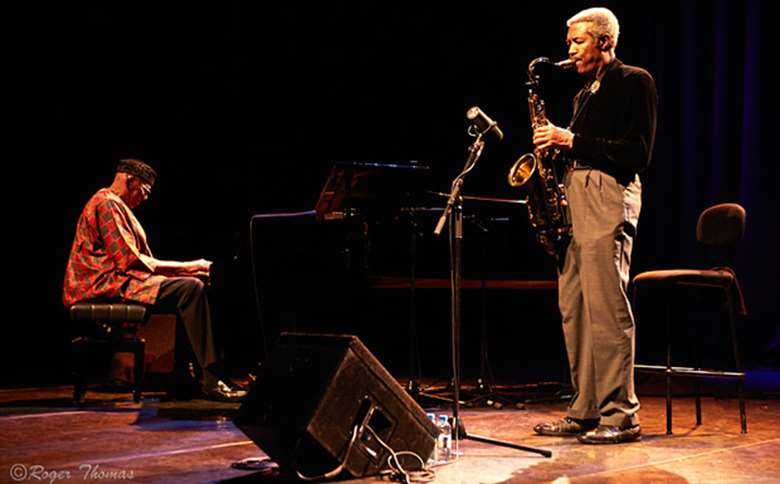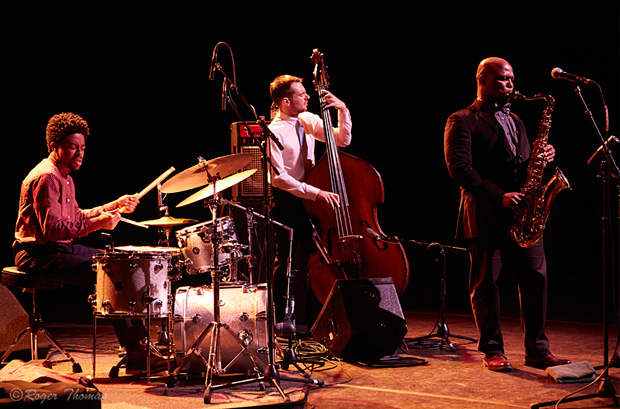Randy Weston and Billy Harper – Deeper than blue at QEH, EFG London Jazz Festival
Tuesday, November 18, 2014
Just a few days prior to this concert, the Branford Marsalis Quartet set the same stage alight with as incendiary an opening salvo for the EFG London Jazz Festival as could have been hoped for.

Although pianist Randy Weston and tenor saxophonist Billy Harper (above) draw a significantly smaller crowd, the duo nonetheless maintains the same degree of excellence, and perhaps more importantly, shows how the diverse historical foundations of jazz remain launching pads for new musical adventures.
Marsalis was firmly rooted in bebop soil. Weston and Harper are planted deep in the earth of the blues. Their artistic triumph is that they are able to show how fertile is the land and how much it shifts into new territory by dint of the strength of character of the performers. 88 year-old Weston’s Monkish modernism, a furrow he has ploughed since the 1950s, is personalised by a fabulously strong touch, which lends to his low register lines the kind of granite-like density that does not leave the audience wanting for the sound of a double bass or kick drum, while the quicksilver runs of his right hand are both percussively fluid and teasingly fragmented, introducing ample breathing space into anthems such as ‘The Healers’ and the evocative solo piano piece ‘Night In Medina.’
Weston demonstrates the underlying African rhythm of ‘Hi-Fly’; his signature tune dating from 1959, by tapping the wooden frame of the piano as if it were a conga and so highlights the other major musical as well as cultural and political component of his life’s work. Yet the giant New Yorker gleefully recalls the moment he heard Coleman Hawkins’ ‘Body And Soul’ and fell in love with the tenor saxophone, which provides a cue for Harper’s solo feature, ‘If One Could Only See.’ It proves a heart-stopping moment.

In the opening set of the evening J.D Allen (above), leading a well-drilled piano-less trio, had given a fine display of virtuosity on the same instrument, but Harper marks a sharp contrast to the younger player. His tone has a steely, often shrill, piercing quality that imbues his upper register with intense drama – a hark; a cry; a plea – and brings an absolute hush of reverence to the auditorium after his opening statement of the theme.
Long term admirers of the 71 year-old Texan, and they would include anybody from the generation of ‘80s players on whom he has had a clear influence [above all Gary Thomas and Steve Williamson], would have felt at home, as this sound has been in evidence since his classic 1975 album Black Saint. But Harper is imperious tonight, dispensing often terse, condensed, fraught lines that are night to the lengthy, florid flights of Allen’s day. Harper’s bass notes have a bulk and heft that need little amplification and gain more power for the way he plays them off against silence, but the central draw of the performance is his consistent reprise and re-harmonisation of the melody.
Like a Baptist preacher, he uses it as a solid bedrock, and makes the song sing effortlessly, reminding the audience that the church still has an immense part to play in the ongoing development of black music. When Weston again joins Harper on another of the pianist’s own enduring compositions, ‘Blue Moses’, which segues into Kofi Ghanaba’s ‘Love, The Mystery Of’, the two musicians reach the kind of advanced conversational intimacy only master players achieve. The notes, tones, thoughts and emotions feel as much of yesterday as of today.
– Kevin Le Gendre
– Photos by Roger Thomas